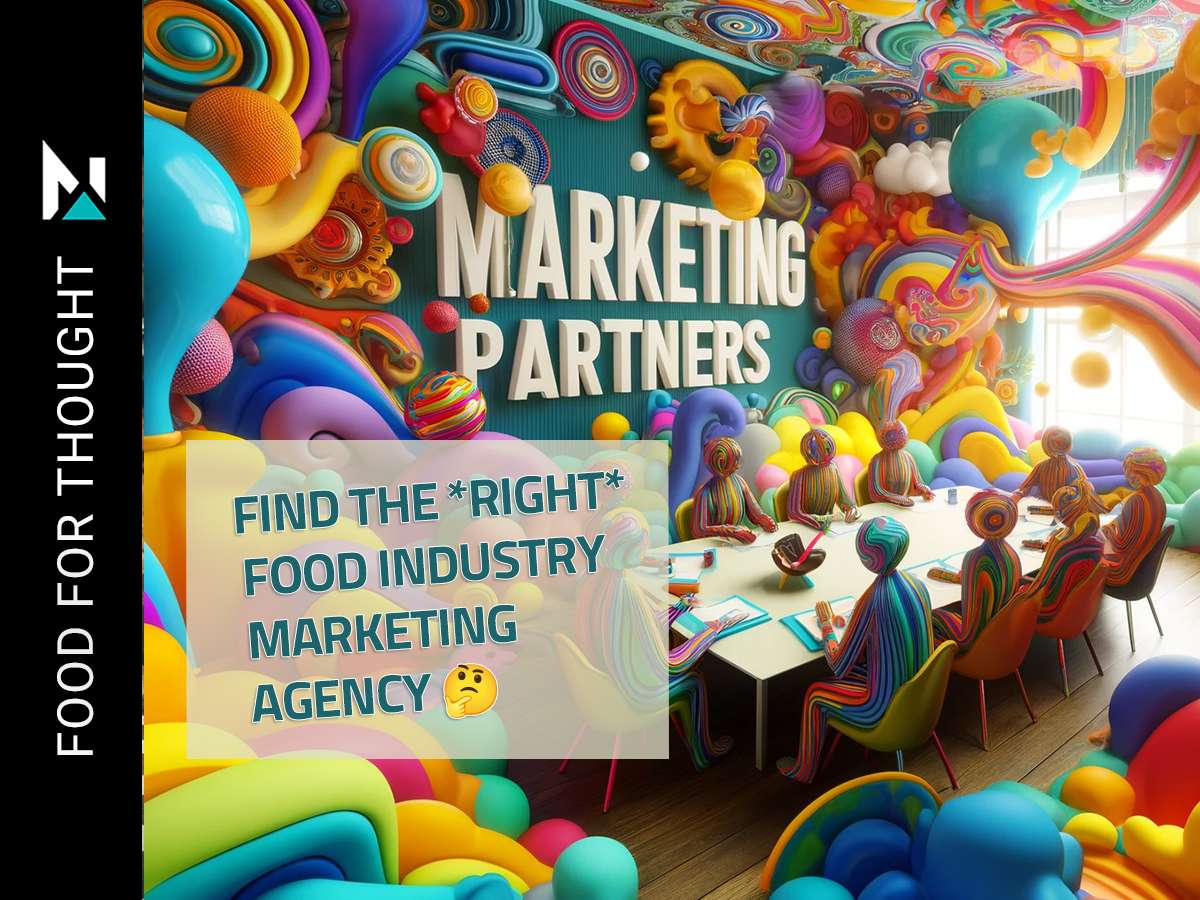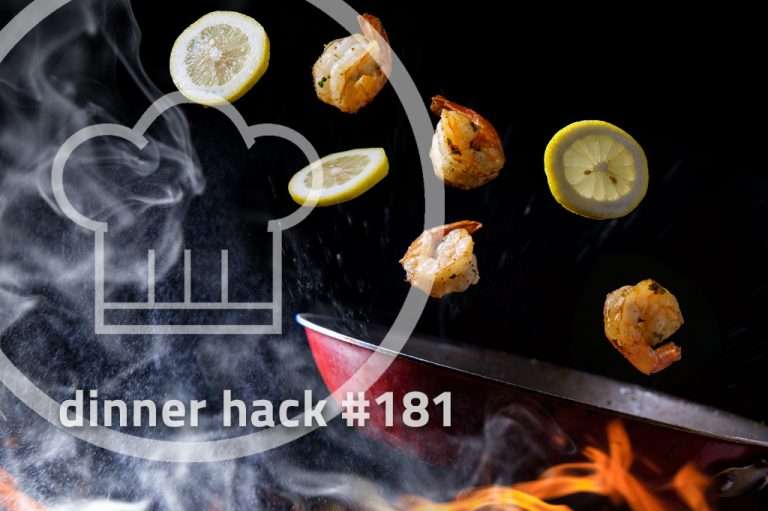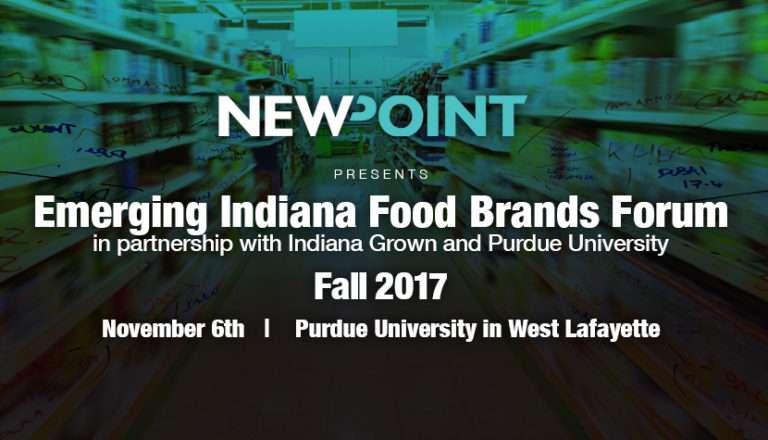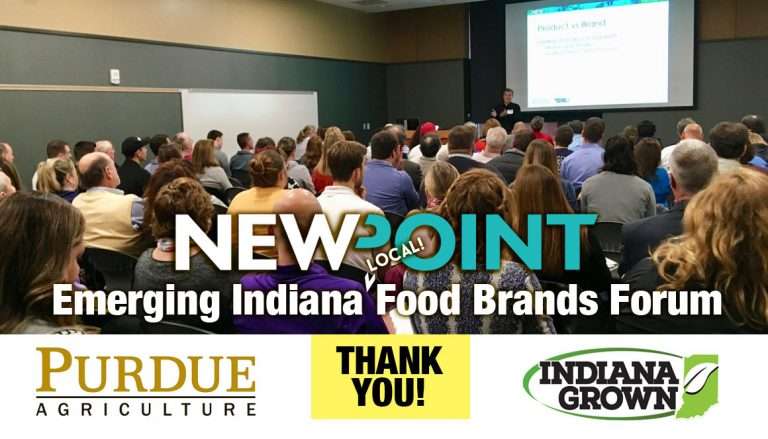May 28, 2024
Find the *Right* Food Industry Marketing Agency 🤔
Looking for a Food Industry Marketing Agency? 🤔 Tips to Find the *Right* One
Our firm, Newpoint Marketing, is a top food industry marketing agency. This means we regularly receive emails and telephone calls from some of the country’s biggest and smallest food brands.
Although our SEO does a good job of placing our firm high on the Google search page, the main reason food manufacturers, processors, and their marketing and sales execs, directors, and brand managers are reaching out can be summed up by what makes us different than your regular agency; we know this:
— Every sale in the food industry starts with a B2B sale —

So we work hard with sales teams to market into all food industry channels, from retail to food service and everything in between, including K-12, university, and hospitality. We even have a few clients that only sell to prisons. That’s a niche market, but they do pretty well.
Choosing the right marketing agency is crucial for food brands. The right partner can boost sales and market share. We prepared this blog based on several questions we get asked and some ways we describe our business to folks shopping for a new food industry marketing agency. Hopefully, this will help you find the best food industry marketing agency. We’ll cover key questions to ask potential agencies.
A good agency offers many services. These include branding, packaging, website development, social media, and pitch decks. They should also have expertise in e-commerce and track customer acquisition costs. You can find an agency that meets your needs by asking the right questions.
Section 1: Understanding Your Needs
Choosing the right agency can boost your brand’s success. Focus on goals, audience, and budget to make the best choice.
Identify Your Goals
First, you need to know your brand’s goals. Are you aiming to increase sales or expand your market share? Maybe you want to improve brand awareness or launch a new product. Clear goals help you and the agency create a focused plan. Without clear goals, your marketing efforts might not be effective. Think about what success looks like for your brand. This clarity will guide every step of your marketing journey.
Define Your Target Audience
Next, define who you want to reach. Understanding your target audience is vital. Knowing their preferences and needs can guide your marketing strategies. Who are your customers? What are their interests and behaviors? Are they young adults, busy parents, or health-conscious retirees? Knowing your audience helps tailor your message. It ensures your marketing efforts resonate with them. Use surveys, market research, and customer feedback to gather this information.
Budget Considerations
Finally, set a realistic budget. Determine how much you can spend on marketing services. A clear budget helps you find an agency that fits your financial plans. Your budget should reflect your goals. If you want a large-scale campaign, be prepared to invest more. Also, consider the return on investment (ROI). A higher budget might lead to better results but ensure sustainability. Discuss your budget openly with potential agencies to find the best fit for your needs.
Section 2: Key Questions to Ask Potential Agencies
Choosing the right marketing agency is critical. Asking these questions can help you find the best fit for your food brand. A good agency will have the experience and skills to help your brand grow and succeed in the competitive food industry.
-
What is Your Experience in the Food Industry?
- Industry-Specific Experience: Hiring an agency with food industry experience is crucial. They understand trends, consumer behavior, and unique challenges in this field. Agencies without this expertise might struggle to create effective strategies.
- Concrete Examples: Ask for specific examples of their past work. Have they worked with snack brands, beverages, or organic foods? Specific campaigns and successes show their expertise. For example, they might have increased sales for a local organic food brand or launched a successful social media campaign for a beverage company.
-
What Services Do You Offer?
- Branding and Positioning: Creating a strong brand identity is vital. A recognizable brand can attract and retain customers. The agency should help define your brand’s unique voice and position in the market. They should also create a branding strategy that resonates with your target audience.
- Packaging Design: Packaging plays a huge role in consumer decisions. Good design can make your product stand out on the shelf. The agency should understand the importance of visual appeal and functionality in packaging. They should create designs that catch the eye and convey your brand’s message effectively.
- Website Development: A functional and appealing website is important. It’s often the first impression customers get of your brand. The agency should ensure your website is user-friendly, mobile-optimized, and visually appealing. A well-designed website can enhance the user experience and drive conversions.
- Social Media Marketing: Ask about their strategies for engaging with consumers on social platforms. Effective social media marketing can boost brand awareness and loyalty. The agency should create engaging content, manage its social media accounts, and use analytics to track performance and refine strategies.
- Foodservice and Retail Pitch Decks: Professional presentations are crucial. Good pitch decks help sell your products to retailers and foodservice operators. The agency should create compelling pitch decks highlighting your product’s strengths and market potential. These presentations should be visually appealing and persuasive.
-
E-commerce Expertise
- Skills in Online Sales and Digital Marketing: In today’s market, online sales are key. The agency should have skills in e-commerce and digital marketing to drive online revenue. They should know how to optimize your online store, run effective digital ad campaigns, and use SEO to increase your online visibility.
- Cost per Customer Acquisition Tracking: They should track and optimize marketing spend. Knowing the cost per customer acquisition helps in budget planning and maximizing ROI. The agency should use data analytics to measure the effectiveness of their campaigns and make data-driven decisions to improve performance.
Section 3: Evaluating Agency Capabilities
Can You Provide Case Studies or References?
Seeing past work is crucial. It shows the agency’s skills and client satisfaction. Case studies provide detailed examples of their successes. Look for stories that highlight specific achievements. These might include launching a new product or increasing sales. Client testimonials give insight into their experiences. Positive feedback from other food brands can be very reassuring. Measurable results, like sales growth, prove the agency’s effectiveness. Numbers don’t lie and they help you see potential benefits. These details ensure the agency can meet your needs.
How Do You Measure Success?
Understanding how an agency measures success is vital. Key metrics include ROI, customer acquisition cost, and sales growth. ROI shows the return on your investment, a key indicator of efficiency. Customer acquisition cost tells you how much it costs to gain a new customer. This helps in understanding the value of the marketing efforts. Sales growth is a direct measure of success. It shows if the marketing is driving revenue. Regular updates and transparent reporting are also important. They keep you informed and build trust. You need to know what’s working and what isn’t. This helps in making informed decisions and adjustments.
What is Your Approach to Strategy and Innovation?
Customized marketing plans are essential. Each brand has unique needs and goals, so the agency should tailor strategies to those goals. One-size-fits-all doesn’t work in the food industry. Innovative tactics are also crucial. The agency must stay updated with industry trends and new technologies, ensuring your brand remains competitive. New trends and technologies can offer new opportunities, so the agency should proactively use them. This shows they are forward-thinking and adaptable.
Section 4: Practical Considerations of WOrking together
Choosing the right marketing agency is crucial for your food brand. Here are some practical considerations to help you make the best choice.
1. What is Your Communication Style and Frequency?
- Importance of Communication: Regular and clear communication is vital for a successful partnership. It ensures everyone is aligned and progress is made smoothly. Good communication helps prevent misunderstandings and delays. It allows for quick resolution of any issues that may arise.
- Preferred Methods: Understand how the agency prefers to communicate. Do they rely on email, phone calls, or in-person meetings? Knowing their preferred methods can help you gauge how easily you can stay in touch. Make sure their communication style matches your preferences. Some agencies may offer regular updates, while others might be more ad-hoc. Regular check-ins, whether weekly or bi-weekly, can help keep the project on track.
2. What is Your Pricing Structure?
- Transparency: Understanding the pricing structure is key to avoiding unexpected costs. Ask if they charge a retainer, project-based fee, or hourly rate. Transparent pricing helps you plan your budget better. Some agencies might have hidden fees, so it’s essential to get a detailed breakdown of costs upfront.
- Value for Money: Ensure the services offered match the cost. High fees should come with high-quality service. Compare different agencies to find the best value. Don’t just look at the price tag—consider the results they promise. Sometimes, paying a bit more can yield better returns on investment. Look for case studies or client testimonials to gauge the agency’s effectiveness.
Other Considerations
When working with a marketing agency, it’s crucial to have clear expectations. Here are some practical considerations to ensure a smooth collaboration:
- Set Clear Goals: Define what you want to achieve from the partnership. Clear goals help measure success.
- Regular Updates: Ensure the agency provides regular updates on the progress. This keeps you informed and involved.
- Feedback Loop: Establish a feedback loop where both parties can provide input. This helps in making necessary adjustments along the way.
- Flexibility: Be prepared for changes. Marketing strategies may need to adapt based on market trends or campaign performance.
- Trust: Trust the agency’s expertise. While your input is valuable, give them the space to execute their strategies.
Finding the *Right* Food Industry Marketing Agency: Hit the “Easy Button”
Working with the right agency can help your food brand grow. Considering these factors, you can make an informed decision and build a successful partnership.
Choosing the right marketing agency is crucial for food brands. The right partner can boost sales and market share.
At NewPoint Marketing, we understand the importance of B2B sales in the food industry. We work with sales teams to market across all channels, from retail to food service, including K-12, university, and hospitality sectors. Our strategies have helped even niche markets like prisons succeed.
We offer many services: branding, packaging, website development, social media, and pitch decks. We also specialize in e-commerce and tracking customer acquisition costs.
Ready to boost your brand’s market share? Contact NewPoint Marketing today to see how we can help your business thrive.





